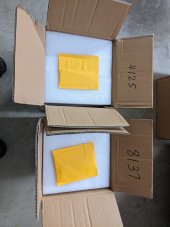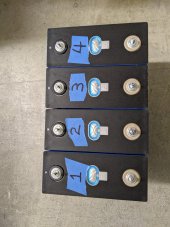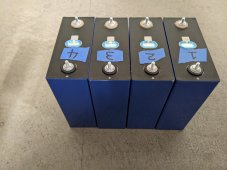What are you quoting here?CATL 280Ah Battery cell performance
The cell has a maximum cycle life of 12000times = 32.8 years of service if treated right. WOW !
You are using an out of date browser. It may not display this or other websites correctly.
You should upgrade or use an alternative browser.
You should upgrade or use an alternative browser.
Our NEW GO-TO LiFePO4 vendor...09.20.21
- Thread starter ghostwriter66
- Start date
Sback
New Member
- Joined
- Jul 5, 2021
- Messages
- 109
This is probably the spec sheet from the same supplier selling the 420ah cells..?What are you quoting here?
triplethreat
Solar Enthusiast
- Joined
- Oct 12, 2021
- Messages
- 129
Well I got some good news from Jenny Wu this morning. It looks like my order of 4 EVE 304 AH battery cells are shipping our of Houston. They are scheduled to be at my house tomorrow afternoon. They have been out of stock for this particular cell for quite some time and she told me that they should be in sometime this week.....and she was correct. Two separate boxes of 2 each I guess, as I have two tracking numbers. Getting ready for my first ever build......wish me well.
So, as far as Jenny Wu being the person I dealt with....she is very professional, very quick to reply to questions, and to be honest, I've been very pleased dealing with and interacting with her. She obviously has no control over when shipments will land in the US or how long they may or may not sit on a cargo ship. So, I just wanted to put that out there and hopefully the cells will arrive tomorrow as scheduled and without any kind of issues regarding the cells themselves.
Update....they arrived this afternoon around 5PM. Pretty amazing since the shipping ticket was created late Thursday evening. So from Houston to Knoxville, TN area...basically two days of travel. And the best news......they not only look 100% brand new, there is absolutely zero damage, no bulging and the measured voltage with a Fluke77 meter....
Battery 1: 3.289V
Battery 2: 3.289V
Battery 3: 3.289V
Battery 4: 3.288V
These also came with welded studs, and as others have stated....that is a pretty small surface area for the battery lug to be clamped onto. All in all, so far, I'm well pleased. And thanks again to #Jenny Wu for the excellent Customer Service with my order.
So, as far as Jenny Wu being the person I dealt with....she is very professional, very quick to reply to questions, and to be honest, I've been very pleased dealing with and interacting with her. She obviously has no control over when shipments will land in the US or how long they may or may not sit on a cargo ship. So, I just wanted to put that out there and hopefully the cells will arrive tomorrow as scheduled and without any kind of issues regarding the cells themselves.
Update....they arrived this afternoon around 5PM. Pretty amazing since the shipping ticket was created late Thursday evening. So from Houston to Knoxville, TN area...basically two days of travel. And the best news......they not only look 100% brand new, there is absolutely zero damage, no bulging and the measured voltage with a Fluke77 meter....
Battery 1: 3.289V
Battery 2: 3.289V
Battery 3: 3.289V
Battery 4: 3.288V
These also came with welded studs, and as others have stated....that is a pretty small surface area for the battery lug to be clamped onto. All in all, so far, I'm well pleased. And thanks again to #Jenny Wu for the excellent Customer Service with my order.
Attachments
Last edited:
Maintenance guy
New Member
What are you quoting here? Hello "CATL"
i am quoting off of CATL's web site that there new batteries offer 12000 cycles now. that is 32 years of service. CATL must have one hell of an R&D team.
i am quoting off of CATL's web site that there new batteries offer 12000 cycles now. that is 32 years of service. CATL must have one hell of an R&D team.
Do you have a link?
There are several references to CATL's 12000 cycle life cells if one does a google  I would really love to see a spec sheet for these cells as well as the price. As far as I can tell CATL made the announcement in 2019.
I would really love to see a spec sheet for these cells as well as the price. As far as I can tell CATL made the announcement in 2019.
It might be Evlithium can get them. I personally have no interest in buying these but perhaps someone who may be interested can contact Evlithium and see if they will supply a spec sheet as well as pricing.

It might be Evlithium can get them. I personally have no interest in buying these but perhaps someone who may be interested can contact Evlithium and see if they will supply a spec sheet as well as pricing.

CATL New LiFePO4 Battery 280Ah Prismatic Cell
CATL 3.2V 280Ah Lithium iron phosphate battery cell with more than 10000times super long cycle life
www.evlithium.com
robby
Photon Vampire
- Joined
- May 1, 2021
- Messages
- 4,117
CATL 280Ah Battery cell performance
The cell has a maximum cycle life of 12000times = 32.8 years of service if treated right. WOW !
They should last for 32 years yet they only warranty them for 3 ?
Sback
New Member
- Joined
- Jul 5, 2021
- Messages
- 109
I laughe at people who convert cycle life to calendar life. Cycle life has nothing to do with calendar life, its strictly cycles. All lfp holds the same Callender life. Regardless of cycles.
They should last for 32 years yet they only warranty them for 3 ?
robby
Photon Vampire
- Joined
- May 1, 2021
- Messages
- 4,117
Cycle life and calendar life are two different things but for our application which is what they are selling those batteries for they will typically get one full cycle per day. You are wrong about all LFPs having the same calander life. That is very dependent on the quality of construction. We have already seen cheaply made LFP batteries leak within the first few months after being sold (see Will's Video) while other have gone way past 10 years.I laughe at people who convert cycle life to calendar life. Cycle life has nothing to do with calendar life, its strictly cycles. All lfp holds the same Callender life. Regardless of cycles.
Last edited:
robby
Photon Vampire
- Joined
- May 1, 2021
- Messages
- 4,117
Have you noticed that in the last 6 months the Trend on cells being sold on Alibaba has been pretty consistent?I know that a while back CATL claimed to have a million mile LIFEPO4 battery for electric vehicles. Tesla is currently using the "million mile" CATL LIFEPO4 battery in some of their electric vehicles in China.
6 months ago most said 2000-3000 cycles. Then about 4 months ago 6000 became common. Then 3 Months ago it was 7000 cycles and now it's 12,000 cycles. I suspect that in another two months they will be telling us 20,000 cycles.
It's all about making you spend money with them and not their competitor.
This is one reason its important to always ask for a manufacturer datasheet and basically take with a grain of salt all technical claims made by the seller if they cannot be verified.Have you noticed that in the last 6 months the Trend on cells being sold on Alibaba has been pretty consistent?
6 months ago most said 2000-3000 cycles. Then about 4 months ago 6000 became common. Then 3 Months ago it was 7000 cycles and now it's 12,000 cycles. I suspect that in another two months they will be telling us 20,000 cycles.
It's all about making you spend money with them and not their competitor.
Sback
New Member
- Joined
- Jul 5, 2021
- Messages
- 109
I agree with what your saying. I was just stating that cycle life has nothing to do with calender life. The average Callender life of lfp is 10 years. Yes there are the cases of just a bad cell that prematurely fails.Cycle life and calendar life are two different things but for our application which is what they are selling those batteries for they will typically get one full cycle per day. You are wrong about all LFPs having the same calander life. That is very dependent on the quality of construction. We have already seen cheaply made LFP batteries leak within the first few months after being sold (see Will's Video) while other have gone way past 10 years.
Horsefly
Solar Wizard
I think this statement can be very misleading. I believe that cycle life - as described by cell manufacturers - is the number of full charge / recharge cycles until the usable capacity has dropped to 80% of its original capacity. For the purposes of discussions here, I think people refer to "calender life" as that same measure, in time. That is, people only care about that same measure translated to calendar months / years. So if I have an application where I cycle the batteries literally every day, if the cycle life is 2,000 cycles, then the useful calendar life of those cells is 2,000 / 365 = about 5.5 years.I was just stating that cycle life has nothing to do with calender life.
If I may ask, where does your 10 years calendar life come from?
robby
Photon Vampire
- Joined
- May 1, 2021
- Messages
- 4,117
I think he is using the average warranty period as many of the battery pack makers offer a 10 year warranty. Who knows what the reality is, these battery packs may last 15 years or more.If I may ask, where does your 10 years calendar life come from?
But that is not what Calendar Aging means at all.For the purposes of discussions here, I think people refer to "calender life" as that same measure, in time. That is, people only care about that same measure translated to calendar months / years.
I don't know how most people here interpret the term, but if they assume it means cycle life in years, they are fundamentally misunderstanding the meaning.
Here is one succinct definition of Calendar Aging:
In other words calendar aging is the aging that occurs at rest and independent from cycle life aging. My understanding is that Cycle and Calendar aging are separate and parallel concepts, which are both in turn affected by a number of different variables.Calendar aging comprises all aging processes that lead to a degradation of a battery cell independent of charge-discharge cycling. (SOURCE)
Two of the main factors leading to accelerated calendar aging are storage at high SOC and storage at high temperature.
What you are referring to (Cycle aging expressed in years) is something different than Calendar Aging, its just a different (and probably very rough) way to express cycle life in units of time rather than number of cycles.
Horsefly
Solar Wizard
That's fine, but abusing the cells in terms of storage at high temperature or high SoC will reduce the number of cycles too.But that is not what Calendar Aging means at all.
I don't know how most people here interpret the term, but if they assume it means cycle life in years, they are fundamentally misunderstanding the meaning.
Here is one succinct definition of Calendar Aging:
In other words Calendar aging is the aging that occurs independent from cycle life aging. My understanding is that Cycle and Calendar aging are separate and parallel concepts, which are both in turn affected by a number of different variables.
Two of the main factors leading to accelerated calendar aging are storage at high SOC and storage at high temperature.
What you are referring to (Cycle aging expressed in years) is something different than Calendar Aging, its just a different (and probably very rough) way to express cycle life in units of time rather than number of cycles.
I stand by my statement, that most people care about how long their cells will last in their situation if they take care of them. That is, how many times they cycle them in a given time, projected over time. I don't see any meaningful reason to discuss calendar life unless it is in terms of how long the cells will last for them.
Besides, the original statement was that the calendar life of LiFePO4 is 10 years, period. Clearly that doesn't fit your definition either.
kid744
New Member
Similar threads
- Replies
- 2
- Views
- 219
- Replies
- 4
- Views
- 233





